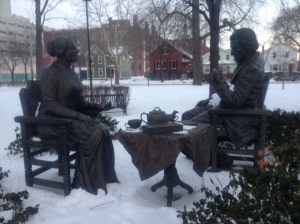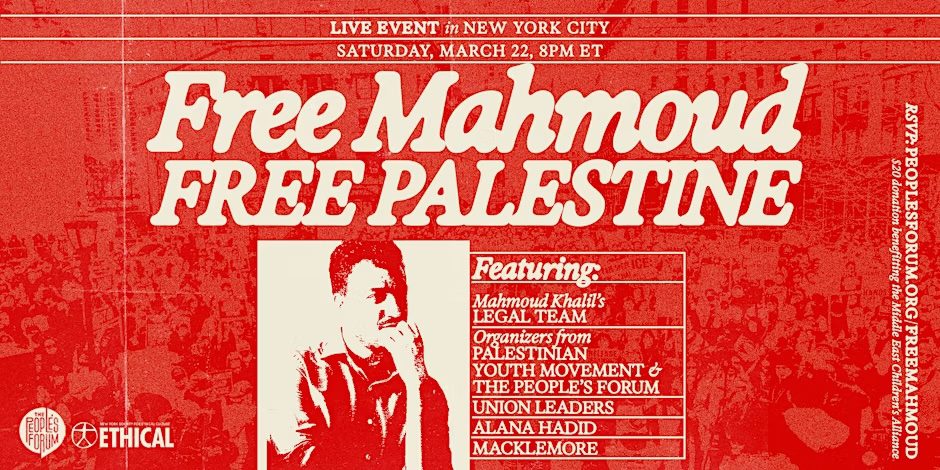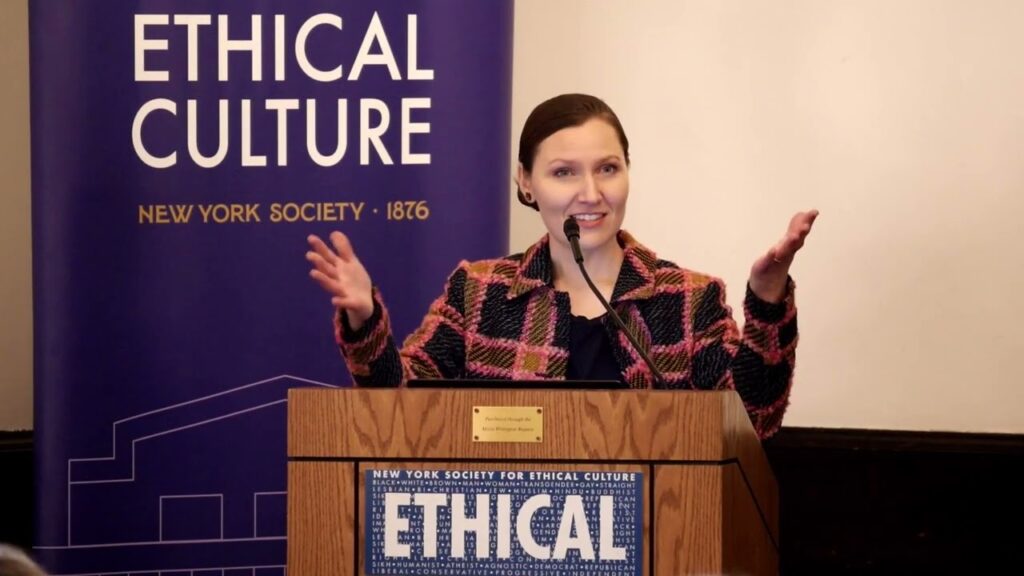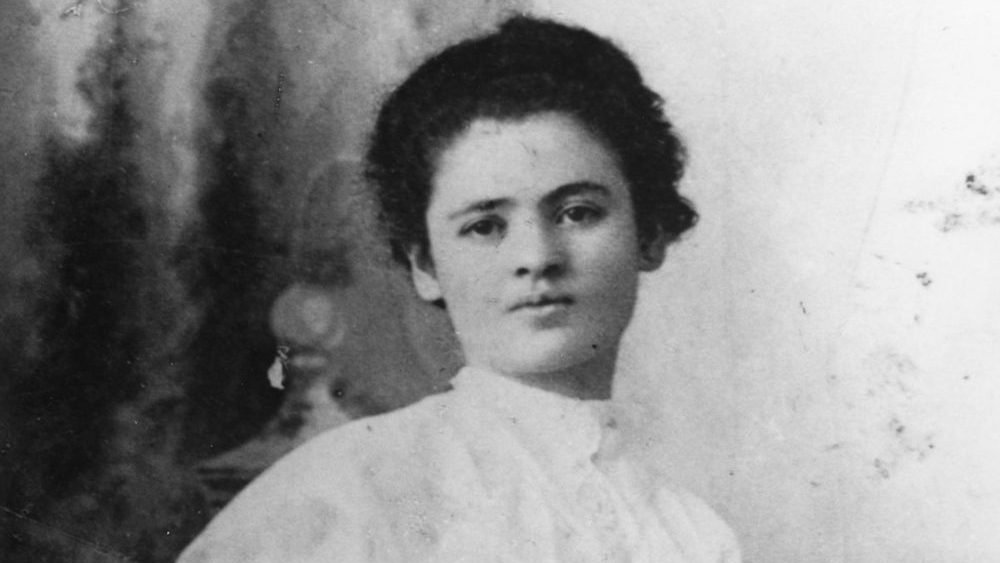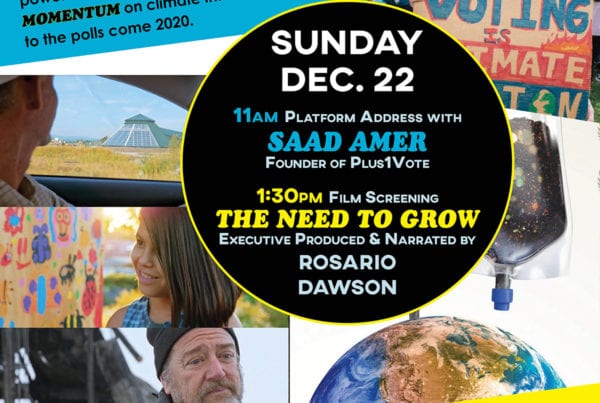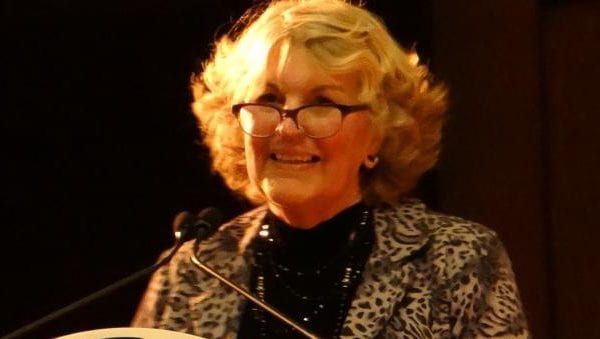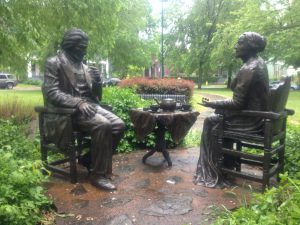
Description:
In the center of a lovely park square in Rochester, New York is a striking sculpture, a tribute to the friendship between Frederick Douglass (1818 [chose to celebrate on 2/14] – Feb. 20, 1895) and Susan B. Anthony (Feb. 15, 1820- March 13, 1906), whose bodies are interred in nearby Mount Hope Cemetery. It is called “Let’s Have Tea,” and that’s just what these neighbors are doing: sitting together, with a table between them set with a teapot, two cups, and two books. “They’re not talking about any particular issue,” says the sculptor Pepsy Kettavong, “but they both are anxious to hear what each is thinking. You’re not quite sure who’s talking or who’s listening, so you have that balance.” Inspired by this sculpture, which I have visited and photographed several times, I imagined a conversation between these two friends and wrote this short play using their own words and a few of my own. On Sunday, 2/2/14, my friend, Mr. Leonardo Gibson, and I performed it at the New York Society for Ethical Culture.
* * * * *
• Act 1: Getting reacquainted with memories of early friendship
Douglass (walking over to Anthony): My dear friend, I’m so happy to see you again! (extends hand to shake hers)
Anthony: And I you, Mr. Douglass! (grasps his hand and indicates the chairs) Please have a seat. We are long overdue for a conversation. How I have missed sitting with you here in this park so close to our homes.
Douglass (looking around): Now, in which direction are our homes? It has been so long that I feel disoriented.
Anthony (pointing): My home is still over there at 17 Madison Street. I died there in 1906 at the age of 86, not long after I gave a speech on “Failure is Impossible” in Baltimore. Can you believe it? It’s a museum now, just like your home at Cedar Hill in Anacostia outside Washington, DC. They sell T-shirts with “Failure is Impossible” printed on them (displays shirt). And over there (pointing again) is where you lived on South Avenue. What a shame your house burned down.
Douglass (shaking his head sadly): We never did learn the cause of that fire. But by 1872 so much of my work was in Washington that it was time to move.
Anthony: Ah yes, 1872. That was the year I voted in the presidential election on November 5, and two weeks later a U.S. Deputy Marshal arrested me right in my home. My trial was held in Canandaigua, and seven months later I was convicted, in spite of what I thought was a persuasive argument.
Douglass: Eloquent, yes, but clearly not persuasive.
Anthony: But I based it on the Fourteenth Amendment (assuming a pose): “All persons born or naturalized in the United States, and subject to the jurisdiction thereof, are citizens of the United States and of the State wherein they reside. No State shall make or enforce any law which shall abridge the privileges or immunities of citizens of the United States; nor shall any State deprive any person of life, liberty, or property, without due process of law; nor deny to any person within its jurisdiction the equal protection of the laws.” Supreme Court Associate Justice Ward Hunt refused to allow me to testify and ordered the jury to return a guilty verdict.
Douglass: Not that he could stop you from talking anyway, Miss Anthony. No man could.
Anthony (smiling): Except you, Mr. Douglass, and many was the time you encouraged me to speak. I had to ignore that judge; it just wasn’t fair. “May it please your honor,” I said. “I will never pay a dollar of your unjust penalty. All the stock in trade I possess is a debt of $10,000, incurred by publishing my paper – The Revolution – the sole object of which was to educate all women to do precisely as I have done, rebel against your man-made, unjust, unconstitutional forms of law, which tax, fine, imprison and hang women, while denying them the right of representation in the government; and I will work on with might and mine to pay every dollar of that honest debt, but not a penny shall go to this unjust claim.”
Douglass (chuckling): Yes, I recall reading about that “scandal.” You know, as much as I loved Cedar Hill, I still have fond memories of Rochester. I moved here after lecturing in England – and my friends there had paid Captain Auld for my freedom so that I could safely travel. I wrote to one of my abolitionist friends back in October of 1847: “I have finally decided on publishing the North Star in Rochester and to make that city my future home.” The first issue was published on December 3, 1847, and by February I began to move my family here.
Anthony: I remember your wife Anna fondly – and your five children. Oh, let me see if I can remember their names: Rosetta, Lewis, Frederick Jr., Charles and little Annie.
Douglass: Very good! Yes, Anna helped me escape from slavery. She was born free, you know. When we moved to Rochester, she established a headquarters for the Underground Railroad from our home and gave food and lodging to hundreds of fugitive slaves on their way to Canada. My income from giving speeches was so sporadic that she worked as a laundress and learned to make shoes to support our family.
Anthony: Anna was a strong woman. I remember how she prevailed upon you to train your sons as typesetters for the North Star.
Douglass (sighing): Ah, the North Star, my own abolitionist paper. I ignored the advice of the American Anti-Slavery Society and finally broke with William Lloyd Garrison to become a publisher. When they questioned me, I responded: “I still see before me a life of toil and trials. . . but justice must be done, the truth must be told. . . I will not be silent.”
Anthony: What a heady time that was for us here in Rochester! We were such close friends before and during the Civil War. You used your paper to not only denounce slavery, but to fight for the emancipation of women and other oppressed groups. I loved your motto: “Right is of no Sex – Truth is of no Color – God is the Father of us all, and we are all brethren.”
Douglass: In the issue I published after the first Women’s Rights Convention in Seneca Falls in July 1848, I wrote: “In respect to political rights, we hold woman to be justly entitled to all we claim for man. We go farther, and express our conviction that all political rights which it is expedient for man to exercise, it is equally so for women. “. . . if that government is only just which governs by the free consent of the governed, there can be no reason in the world for denying to woman the exercise of the elective franchise, or a hand in making and administering the laws of our land.”
Anthony (applauding): How I wish I could have been there with you and Elizabeth Cady Stanton! Just think of it: 300 women and men were there, and the Declaration of Sentiments was signed by 68 women and 32 men – including you, of course. You know, my mother attended the Rochester Women’s Rights Convention two weeks later and signed the declaration. It wasn’t until 1849 that I was able to quit teaching and move back home.
Douglass: Well, it didn’t take you long to get involved, my friend.
Anthony: No, it didn’t. And you brought the National Negro convention to Rochester in July of 1853. There were 140 delegates! You made Rochester a focal point in the struggle for abolition.
Douglass: When the war began, I urged President Lincoln to employ colored troops and sign the proclamation of emancipation. I was gratified that he sought my counsel and truly listened. Permission for organizing these troops was granted in 1863, and I used my paper, which was by then called the Douglass Monthly, to recruit Union soldiers for the Fifty-fourth and the Fifty-fifth Massachusetts Volunteers.
Anthony: And your sons Charles and Frederick Jr. served, didn’t they?
Douglass: Yes – and they survived. I hung a picture of the 54th storming Fort Wagner in the front hallway of Cedar Hill. Did you know that the regiment was made famous to a younger generation in 1989 by the movie “Glory”?
Anthony: Well, I’ll be!
Douglass: Then in 1866, you and I and Mrs. Stanton founded the American Equal Rights Association, demanding universal suffrage.
Anthony: Yes, but it was disbanded just three years later, Mr. Douglass. The Fourteenth and Fifteenth Amendments came between us. It was heartbreaking to take opposite stands.
• Act 2: A time of conflict followed by reconciliation
Douglass: Heartbreaking indeed. We both did what we thought was best. I never doubted your sincerity, Miss Anthony.
Anthony: Nor I yours. Still, it was a very difficult time. Elizabeth warned us: “If that word ‘male’ be inserted as now proposed, it will take us a century at least to get it out again,” and she was right. Women won the vote in 1920, but we still don’t have full equality.
Douglass: I understand, but I stand by what I said in 1868 at a meeting of the American Equal Rights Association: “I champion the right of the negro to vote. It is with us a matter of life and death, and therefore cannot be postponed. I have always championed women’s right to vote; but it will be seen that the present claim for the negro is one of the most urgent necessity. The assertion of the right of women to vote meets nothing but ridicule; there is no deep seated malignity in the hearts of the people against her; but name the right of the negro to vote, all hell is turned loose and the Ku-Klux and Regulators hunt and slay the unoffending black man. The government of this country loves women. They are the sisters, mothers, wives and daughters of our rulers; but the negro is loathed. . . The negro needs suffrage to protect his life and property, and to answer him with respect and education. He needs it for the safety of reconstruction and the salvation of the Union; for his own elevation from the position of a drudge to that of an influential member of society.”
Anthony: I understand, too, but still I stand by the motto of my women’s rights journal, The Revolution: “The true republic – men, their rights and nothing more; women, their rights and nothing less.” And don’t forget what Sojourner Truth said at the first meeting of the America Equal Rights Association in 1867: “I am glad to see that men are getting their rights, but I want women to get theirs, and while the water is stirring I will step into the pool. . . [I]f colored men get their rights, and colored women not theirs, the colored men will be masters over the women, and it will be just as bad as it was before. So I am for keeping the thing going while things are stirring; because if we wait till it is still, it will take a great deal to get it going again.”
Douglass: No, I haven’t forgotten, and there was plenty of hurt when the 14th and 15th amendments passed and women were excluded. I was hurt, too, by some of the things you and Mrs. Stanton wrote.
Anthony: I am truly sorry. Reconstruction was a time of great conflict as we all travelled across the country trying to win people over to our positions. Do you remember the time in March 1869 when Elizabeth and I ran into you on our way from Galena, Illinois to Toledo, Ohio?
Douglass: Well, if I hadn’t remembered it, I could read Mrs. Stanton’s article about it in The Revolution.
Anthony (chuckling): That was quite a description of you! (quoting) “Douglass was dressed in a cap and great circular cape of wolf skins. He really presented a most formidable and ferocious aspect. . . I trembled in my shoes and was almost as paralyzed as Red Riding Hood in a similar encounter.”
Douglass: Surely she exaggerated.
Anthony: Of course, she did, and she went on: “But unlike the little maiden, I had a friend at hand and, as usual, in the hour of danger, I fell back in the shadow of Miss Anthony, who stepped forward bravely and took the wolf by the hand.” Well, we were friends, after all, Mr. Douglass, and you were very gracious. Your smile reassured both of us. I enjoyed the debate we had on that journey.
Douglass: As did I, and immediately after the adoption of the Fifteenth Amendment in 1870, I called for an amendment giving women the right to vote, and wrote an editorial entitled “Women and the Ballot.”
Anthony: Thank you for your undying support. I remember that in 1888 you even called women’s rights a more important cause than abolition.
Douglass: That was at a meeting of the New England Woman Suffrage Association in May. I said, “My special mission… was the emancipation and enfranchisement of the negro. Mine was a great cause. Yours is a much greater cause, since it comprehends the liberation and elevation of one half of the whole human family.” “The fundamental proposition of the woman suffrage movement is scarcely less simple than that of the anti-slavery movement. It assumes that woman is herself. That she belongs to herself.”
The two friends smile at one another and reach out to grasp hands. Then Douglass sits back, looks around and sighs.
Douglass: You said that you died in your home. Well, so did I – of a heart attack.
Anthony: Oh, I remember! I was very distraught. We had sat together just hours before at the Women’s National Council triennial meeting in Washington, DC. You received a standing ovation, as I recall.
Douglass (nodding): It was a very busy day, and I had called a carriage to take me to another meeting when I just stopped. (smiling) I died in my dear wife Helen’s arms.
Anthony: Ah, Helen. What a lovely woman – and another New Yorker, born in Honeoye. Our friend Francis James Grimke officiated at your wedding. What a shame that her parents, Gideon and Jane Pitts, both staunch abolitionists, were against the marriage because you were the son of a white father and a black mother.
Douglass: Well, as I said then: “This proves I am impartial. My first wife was the color of my mother and the second, the color of my father.” I appreciated your support – and Mrs. Stanton’s. I loved what she said: “If a good man from Maryland sees fit to marry a disenfranchised woman from New York, there should be no legal impediments to the union.”
Anthony: Yes, that’s our friend Elizabeth, all right.
Douglass: “No man, perhaps, had ever more offended popular prejudice than I had . . . done. I had married a wife. People who had remained silent over the unlawful relations of white slave masters with their colored slave women loudly condemned me for marrying a wife a few shades lighter than myself. They would have had no objection to my marrying a person much darker in complexion than myself, but to marry one much lighter, and of the complexion of my father rather than of that of my mother, was, in the popular eye, a shocking offense, and one for which I was to be ostracized by white and black alike.”
Anthony: Indeed. (pauses, then says) I had offers of marriage but turned them down. I had a good sense of humor and was respected even by my enemies, so I was told, but my honesty was uncompromising, as you know. Sometimes when I was on the road lecturing, I longed “to lay my weary head somewhere and nestle my full soul close to that of another in full sympathy.” Let us hope that the right to choose whom we love and marry will one day be fully guaranteed to everyone.
They smile at one another.
• Part 3: Looking to the future
Anthony: So, my friend, our time together is drawing to a close. I wonder if we really made any difference. It seems to me that so many of the injustices we fought are still prevalent over a century after we died.
Douglass: It’s true, Miss Anthony. People were always asking me about “the race problem,” and I answered, “I know of no race problem, The great problem that confronts the American people today is a national problem – whether this great nation of ours is great enough to live up to its own convictions, carry out its own declaration of independence, and execute the provisions of its own constitution.” “The life of the nation is secure only while the nation is honest, truthful and virtuous.”
Anthony: I agree, Mr. Douglass. “Cautious, careful people, always casting about to preserve their reputation and social standing, never can bring about a reform. Those who are really in earnest must be willing to be anything or nothing in the world’s estimation, and publicly and privately, in season and out, avow their sympathy with despised and persecuted ideas and their advocates, and bear the consequences.”
Douglass (nodding): “It is not the light that we need, but fire; it is not the gentle shower, but thunder. We need the storm, the whirlwind, and the earthquake.” “Where justice is denied, where poverty is enforced, where ignorance prevails, and where any class is made to feel that society is an organized conspiracy to oppress, rob and degrade them, neither persons nor property will be safe.”
Anthony: As I wrote to Mrs. Stanton in 1902, “We little dreamed when we began this contest, optimistic with the hope and buoyancy of youth, that half a century later we would be compelled to leave the finish of the battle to another generation of women. . .These strong, courageous, capable young women will take our place and complete our work. There is an army of them where we were but a handful.”
Douglass: And one of those women is Lovely A. Warren, an African-American was elected Mayor of Rochester in 2013!
Anthony: She has a tremendous job ahead of her. This city of over 210,000 people has become an international center for higher education, as well as medical and technological development, but the public schools are poorly run, businesses are declining, and the crime rate is rising. The economic disparity between the city and its suburbs is appalling; over a quarter of the population lives below the poverty line.
Douglass: Once again it is important that people “Agitate, agitate, agitate.” “Power concedes nothing without a demand. It never did and it never will.”
Anthony: As I said at my 86th birthday, “with such women consecrating their lives, failure is impossible!”
Douglass: Amen. . . (looking around) You know, I rather like this sculpture of us. What do they call it?
Anthony: “Let’s Have Tea.” Isn’t that wonderful, Mr. Douglass? The sculptor, Pepys Kettavong, who escaped from Laos with his family when he was only 8 years old, said this is “a social statement” and “a metaphor for American democracy.”
Douglass: I hear they have also named a bridge after us.
Anthony: Yes, a bridge over the Genesee River was named the Frederick Douglass-Susan B. Anthony Memorial Bridge in 2007. Folks in Rochester call it the Freddie-Sue Bridge.
Douglass (chuckling): Well, we certainly formed a bridge between many people in our day, didn’t we? I understand that several school scholarships have also been named for us. Now, that is truly an honor.
Anthony: There is one “honor” I wish we hadn’t received, though. A piece of legislation was named after us: The Prenatal Nondiscrimination Act of 2011 (PRENDA – H.R. 3541). Instead of addressing discrimination on the basis of sex, it attempted to restrict health care for women of color under the guise of civil rights. The president of my museum had to answer a lot of phone calls and email about that.
Douglass (shaking his head): Well, I guess it’s to be expected. We are dead, after all, and not able to protest. We’re actually not so far away from one another up there in Mt. Hope Cemetery.
Anthony: It is beautiful there, and so many people visit our graves. Do you suppose that means that we’re not forgotten, Mr. Douglass?
Douglass: Not forgotten at all, Miss Anthony.


